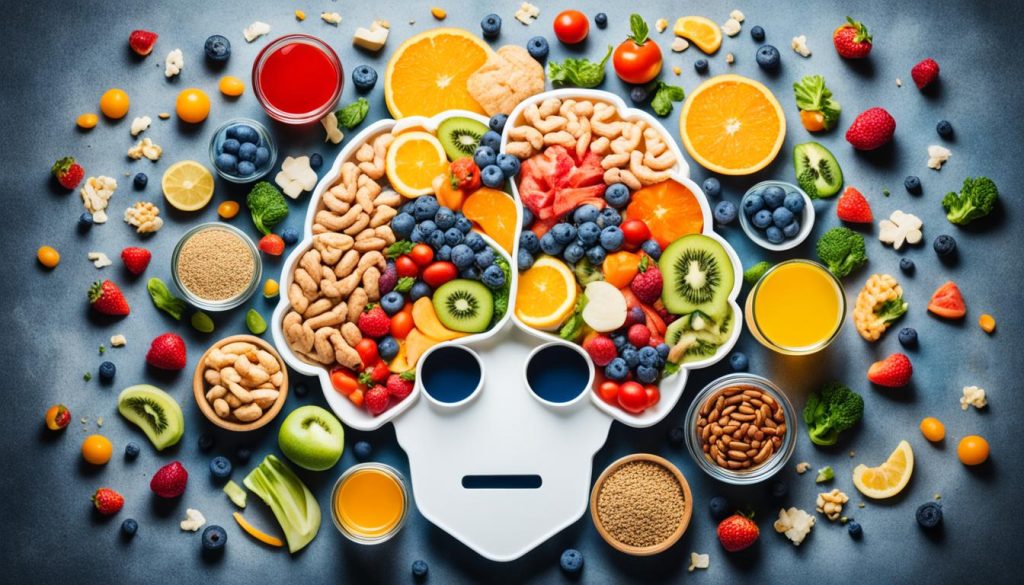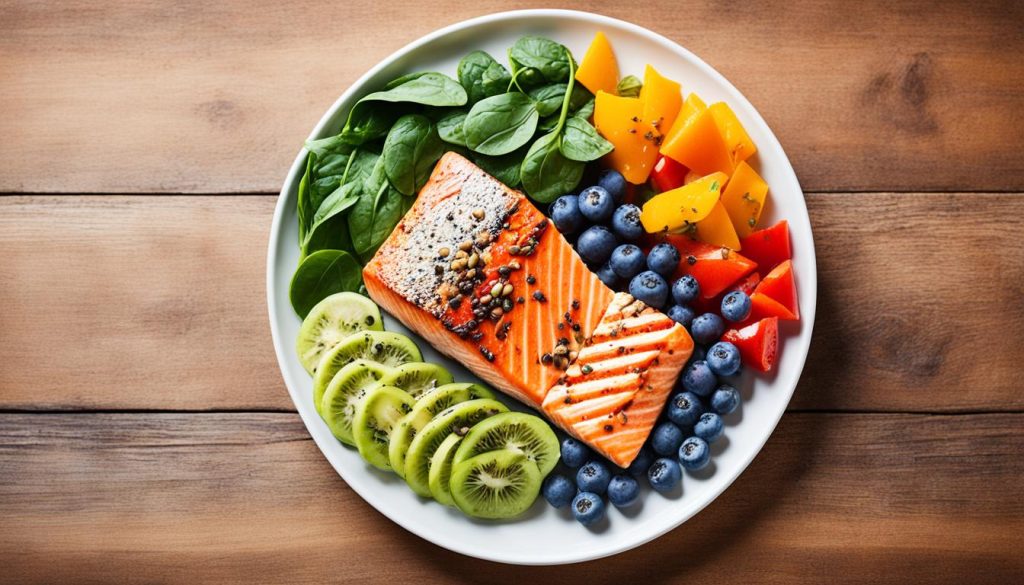The dopamine diet is a weight-loss regime that focuses on increasing levels of dopamine, also known as the “happy hormone,” in order to boost mood.
In the following sections, we’ll explore what dopamine is and how it affects your mood, how the dopamine diet works, what foods you should include and avoid, and how to follow the dopamine diet effectively. We’ll also look at the evidence behind the diet and its potential benefits.
So, if you’re looking to boost your mood and make positive changes in your life, join us on this journey of discovering the dopamine diet and its potential to transform your well-being.
What is a Dopamine Diet?
Dopamine is a brain chemical, also known as a neurotransmitter, that plays a crucial role in transmitting signals between nerve cells in the brain. It serves various functions, including regulating our brain’s reward and pleasure centres, influencing our mood, and impacting motivation, attention, and emotional reward. Dopamine is activated for a range of reasons, including the availability of food.
How Does the Dopamine Diet Work?
The dopamine diet operates under the premise that individuals who are overweight may experience disruptions in dopamine function as a result of continuous exposure to highly palatable, high-fat, and high-sugar foods. While eating naturally increases dopamine levels, the consumption of foods rich in fat and sugar has been linked to heightened appetite, overeating, and long-term weight gain.
By adhering to the dopamine diet and focusing on foods believed to enhance dopamine levels, individuals potentially gain the ability to regulate their dopamine response, thereby decreasing reward-seeking behavior and overeating. However, further research is necessary to grasp the precise effects of the dopamine diet on weight loss and the underlying mechanisms.

What Can I Eat on the Dopamine Diet?
The dopamine diet includes a wide selection of foods that are believed to boost dopamine levels. Incorporating these dopamine diet foods into your meals can help support dopamine production and overall brain health.
- Dairy foods: Include milk, cheese, and yoghurt in your diet. These dairy products are rich in essential nutrients and can contribute to dopamine production.
- Unprocessed meats: Opt for unprocessed meats like beef, chicken, and turkey. These meats are excellent sources of protein, which is necessary for dopamine production.
- Omega-3-rich fish: Include omega-3-rich fish such as salmon and mackerel in your meals. These fish are not only delicious but also provide beneficial nutrients that support brain health and dopamine production.
- Eggs: Incorporate eggs into your diet as they are a great source of protein and contain essential amino acids needed for dopamine synthesis.
- Fruits and vegetables: Include a variety of fruits and vegetables in your meals. Bananas, in particular, are known for their dopamine-boosting properties. Aim for at least five servings of fruits and vegetables per day.
- Nuts: Enjoy nuts like almonds and walnuts as healthy snacks. They are packed with nutrients like magnesium, zinc, and healthy fats, all of which support dopamine production and brain function.
- Dark chocolate: Indulge in dark chocolate with at least 70% cocoa content. Dark chocolate contains compounds that can enhance mood and increase dopamine levels in the brain.

As with any diet, it’s important to maintain balance and moderation. Incorporating these dopamine diet foods into your meals, along with a varied and balanced diet, can help support your overall well-being and mood.
What Foods to Avoid on the Dopamine Diet?
While following the dopamine diet, it is important to be mindful of certain food restrictions to optimize its benefits. Although this diet emphasizes foods that boost dopamine levels, certain items should be avoided or limited. Here are the key food restrictions to consider:
- Alcohol: It is advisable to avoid alcohol while on the dopamine diet. Alcohol consumption can disrupt dopamine regulation and impact mood balance.
- Caffeine: Cutting down on caffeine is recommended. Excessive caffeine intake may interfere with dopamine production and affect overall brain health. Limiting caffeine consumption will aid in promoting a more balanced dopamine response.
- Processed Sugar: It is best to steer clear of processed sugar as it can have detrimental effects on dopamine levels. High consumption of processed sugar has been linked to increased appetite, potential overeating, and reduced dopamine sensitivity. Opt for natural sugars found in fruits instead.
- Carbohydrates: While some versions of the dopamine diet recommend limiting or cutting out carbohydrates, it is important to maintain a balanced approach. Carbohydrates are essential for a healthy diet, and low glycemic index (GI) options, such as rye bread or oats, can stabilize blood glucose levels and positively impact appetite regulation.
By being mindful of these dopamine diet restrictions, you can maximize the potential benefits of this eating plan. However, it is important to note that individual dietary needs may vary, and consulting with a healthcare professional or registered dietitian is always recommended before making any significant dietary changes.
How Should I Follow the Dopamine Diet?
Following the dopamine diet involves making simple dietary choices and focusing on the quality of the foods consumed.
- It is recommended to reduce processed and salty foods, minimize sugary treats, and aim for a minimum of five servings of fruits and vegetables per day. Eating regular meals throughout the day helps regulate hormones and appetite, reducing the chances of overeating.
- At breakfast, it is advised to consume more lean protein, such as eggs, smoked salmon, mackerel, or yogurt with added nuts, seeds, or fruit. Including lean protein sources in your meals, like chicken, lentils, pulses, fish, or lean beef, can further support dopamine production.
- In addition to choosing the right foods, incorporating healthy fats into your diet is important. Monounsaturated and polyunsaturated fats found in oils, avocado, walnuts, and oily fish can contribute to overall brain health and dopamine production.
- Certain lifestyle practices can also influence dopamine levels, in addition to dietary choices. Yoga Nidra, for example, is a relaxation technique that helps reduce stress and promote relaxation, both of which can positively impact dopamine production.
- To get started with the dopamine diet, begin by making small changes to your meals and incorporating the recommended foods. Remember to consult with a healthcare professional or registered dietitian before starting any diet plan to ensure it suits your individual needs.
By following the dopamine diet and making these simple dietary choices, you can support dopamine production and potentially improve your mood and overall well-being.

What’s the Evidence for the Dopamine Diet?
There is emerging evidence to suggest that the dopamine diet may have some beneficial effects. Amino acids, such as tyrosine, found in protein foods, are essential for dopamine production, and increasing protein intake may support dopamine production without increasing appetite.
Studies have shown that eating a high-protein breakfast, including eggs, lean meats, and dairy, can reduce mid-morning cravings and increase dopamine levels.
Furthermore, research on animals suggests that compulsive eating patterns may be triggered by the over-consumption of highly palatable foods, leading to disruptions in dopamine signalling and the ability to regulate food intake.

However, more research is needed to fully understand the effectiveness and long-term outcomes of the dopamine diet, particularly in terms of weight loss.
Conclusion
The dopamine diet offers a unique approach to weight loss by focusing on boosting dopamine levels and potentially reducing reward-seeking behaviour and overeating. By including foods that support dopamine production and overall brain health, individuals may be able to regulate their dopamine response and improve mood. However, it is important to remember that a balanced diet that includes a variety of nutrients and food groups is essential for overall health.
Consulting with a healthcare professional or registered dietician before starting any diet is crucial to ensure it is safe and suitable for individual needs. They can provide personalized advice and guidance based on specific requirements. While the dopamine diet shows promise in enhancing mood and dopamine production, more research is needed to fully understand its effectiveness and long-term outcomes.
In conclusion, dietary strategies that support mood and dopamine levels play a vital role in overall well-being. Incorporating a balanced diet, regular physical activity, and healthy lifestyle practices can contribute to maintaining optimal mental health and promoting a positive mood.
FAQs
What is the dopamine diet?
The dopamine diet is a weight-loss regime that focuses on increasing levels of dopamine, also known as the happy hormone, in order to boost mood.
How does dopamine affect our mood?
Dopamine is a neurotransmitter that plays a crucial role in transmitting signals between nerve cells in the brain, influencing our brain’s reward and pleasure centers and ultimately affecting our mood.
How does the dopamine diet work?
The dopamine diet works on the premise that people who are overweight may have disruptions in how dopamine works due to constant exposure to highly palatable, high-fat, and high-sugar foods. By following the dopamine diet and focusing on foods that are believed to boost dopamine levels, individuals may be able to regulate their dopamine response and potentially reduce reward-seeking behaviour and overeating.
What foods should I avoid on the dopamine diet?
Most versions of the dopamine diet recommend avoiding alcohol, caffeine, and processed sugar. Some versions may also recommend cutting out or restricting carbohydrates, although it is important to include balanced amounts of carbohydrates in the diet.

